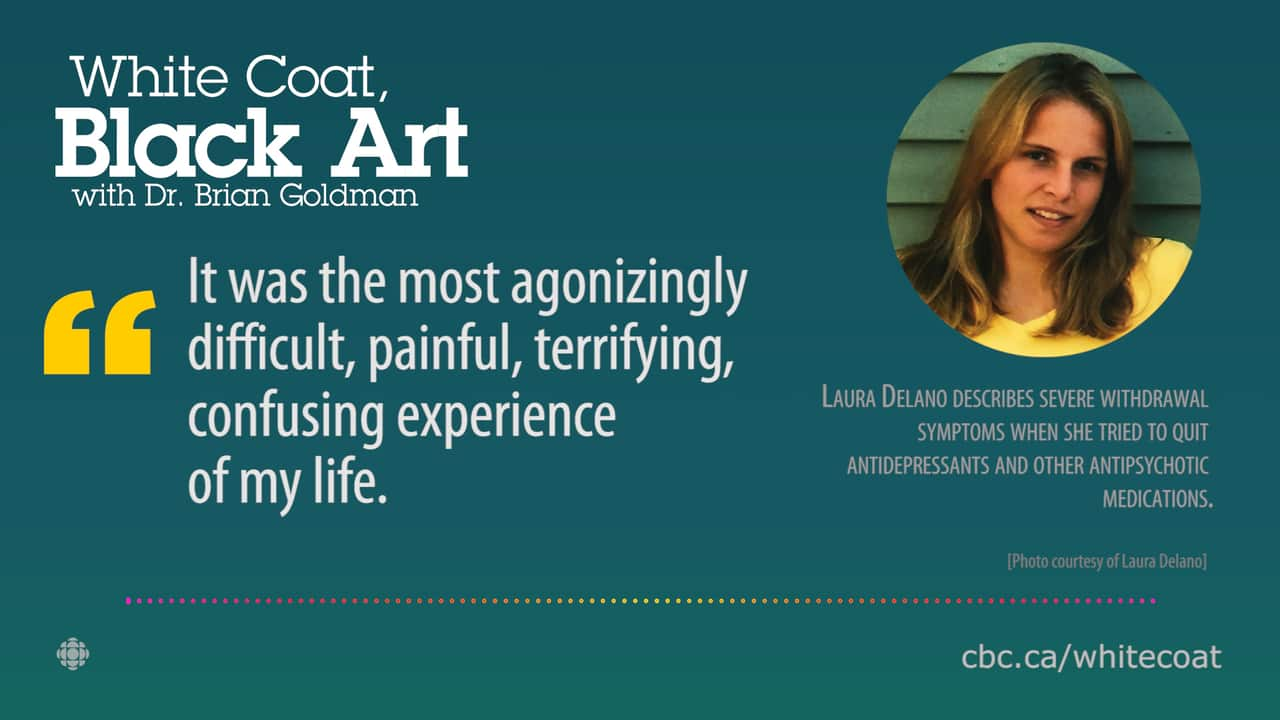
tratto da: http://www.cbc.ca/radio/whitecoat/
12 maggio 2018
'Your story is my story'
Laura Delano was one of those patients leading the way.
As a teenager, the Connecticut woman was diagnosed with juvenile bipolar disorder, and was put on a number of anti-psychotic drugs, including high doses of antidepressants.
As an adult, she quit taking the drugs cold turkey. Like Linda Kooymans, she went through a very difficult withdrawal, which may have been compounded by the fact that she was on several medications.Delano went through a raft of intense symptoms including mood swings, nausea, boils, migraines, and even a strange, smell that emanated from her skin. She was cognitively impaired as well.
As a teenager, the Connecticut woman was diagnosed with juvenile bipolar disorder, and was put on a number of anti-psychotic drugs, including high doses of antidepressants.
As an adult, she quit taking the drugs cold turkey. Like Linda Kooymans, she went through a very difficult withdrawal, which may have been compounded by the fact that she was on several medications.Delano went through a raft of intense symptoms including mood swings, nausea, boils, migraines, and even a strange, smell that emanated from her skin. She was cognitively impaired as well.

White Coat Black Art from CBC Radio
Laura Delano describes severe withdrawal symptoms when she tried to quit antidepressants and other antipsychotic medications 1:10"It was the most agonizingly difficult, painful terrifying, confusing experience of my life," Delano told Dr. Goldman.
It took years before she felt better, but she began writing about her experiences online. People from around the world responded.
"At that time not that many people were speaking out ... [they said] 'Your story is my story' and I need help."
It took years before she felt better, but she began writing about her experiences online. People from around the world responded.
"At that time not that many people were speaking out ... [they said] 'Your story is my story' and I need help."

Laura Delano started taking psychiatric meds at the age of 14 when she was diagnosed with juvenile bipolar disorder. (Submitted by Laura Delano)
Delano was asked to speak at conferences and protests, which led to an opportunity to start a non-profit organization called Inner Compass Initiative.
Our organization is not anti-medication. We are pro-informed choice.- Laura Delano
Their first big effort is The Withdrawal Project. It's a grassroots effort led by lay people who help others cope with psychiatric drug withdrawal symptoms. They don't give medical advice, but provide support and share knowledge with each other about how to taper off medications safely.
"Our organization is not anti-medication. We are pro-informed choice. It is important that as a society we get access to unbiased honest information about what these drugs are and aren't."
Lynda Kooymans wishes she had more information before she went on Cipralex 12 years ago. She eventually managed to slow taper off of the drug, and is now "pretty darn close to normal."
Her advice for people looking to stop their antidepressants?
"Speak to your doctor before you do it. Ask for advice. Set yourself up with coping strategies: your diet, exercise, someone to talk to. Do your own research to find out what the side-effects are and how you can counter them."
For her part, Dr. Mangin says the message for her colleagues is that they need to listen to patients.
"Patients are the experts in the way medicines affect them. Just because it's not written in the drug data sheet, it doesn't mean that it's not a real experience. When numbers of patients are telling us the same thing, we fail to listen to them at our peril."
But there's one more thing to keep in mind. Antidepressant medication is life-saving for many patients. Any changes to medications should be done under the supervision of a doctor.
Delano was asked to speak at conferences and protests, which led to an opportunity to start a non-profit organization called Inner Compass Initiative.
Our organization is not anti-medication. We are pro-informed choice.- Laura Delano
Their first big effort is The Withdrawal Project. It's a grassroots effort led by lay people who help others cope with psychiatric drug withdrawal symptoms. They don't give medical advice, but provide support and share knowledge with each other about how to taper off medications safely.
"Our organization is not anti-medication. We are pro-informed choice. It is important that as a society we get access to unbiased honest information about what these drugs are and aren't."
Lynda Kooymans wishes she had more information before she went on Cipralex 12 years ago. She eventually managed to slow taper off of the drug, and is now "pretty darn close to normal."
Her advice for people looking to stop their antidepressants?
"Speak to your doctor before you do it. Ask for advice. Set yourself up with coping strategies: your diet, exercise, someone to talk to. Do your own research to find out what the side-effects are and how you can counter them."
For her part, Dr. Mangin says the message for her colleagues is that they need to listen to patients.
"Patients are the experts in the way medicines affect them. Just because it's not written in the drug data sheet, it doesn't mean that it's not a real experience. When numbers of patients are telling us the same thing, we fail to listen to them at our peril."
But there's one more thing to keep in mind. Antidepressant medication is life-saving for many patients. Any changes to medications should be done under the supervision of a doctor.

Nessun commento:
Posta un commento